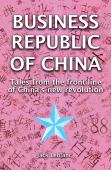Europeans
Do Wacky Things in Asia
(and elsewhere)
reviews of
Business Republic of China
by Jack Leblanc
and
With Bare Hands
by Alain Robert
Blacksmith Books



A Belgian nuclear physics graduate determined to teach in China arrives in the wake of the Tiananmen massacre and soon accidentally gets into business. He starts off trying to get contracts for construction supplies, including a deal with a commercial arm of the military in what would then have been an extremely rudimentary Zhuhai. Other corporate adventures include a JV drinks plant that, he later finds, is actually a cover for a CD factory, and peddling vacuous tech-sounding business plans to venture capital outfits during the dotcom boom. Each chapter deals with a particular episode and ends with bullet points written from today's point of view on how things – sometimes surprisingly – turned out.
It’s a tale of karaoke, hard-bitten cadres-turned-entrepreneurs, karaoke, a fair dose of cultural misunderstanding and more karaoke. It is not a book for everyone; the details of the business deals and alcohol-laden late-night singing sessions can be a bit wearing. But for those nostalgic for that unruly period of the Mainland’s business development leading up to the relatively professional and rules-based environment coming into place today, this is a good read. An interesting reminder of how far China has come in less than a couple of decades. People with an extensive knowledge of Belgian businessmen in China may also have fun guessing who the author is.
For the general reader, With Bare Hands by Alain Robert is far more un-put-downable. As with the best horror stories, it is also all too easy to turn one's eyes away from the page for fear of what will happen next. Robert climbs skyscrapers, using no ropes or other safety equipment apart from exceptionally supple slippers with high-grip soles and a bag of chalk powder to keep his hands dry.
He starts off by recounting his childhood cliff-climbing exploits in France and then describes a growing addiction to scaling taller and taller buildings, starting with easy stuff like the Eiffel Tower and progressing to the world's biggest, including the Sears Tower in Chicago, the Golden Gate in San Francisco, the Petronas Towers in KL, Taipei 101 and Shanghai's Jin Mao Building. The climbs usually end with arrest, sometimes jailing, and even a police beating. But the reader greets these denouements with a sigh of relief – the accounts of grasping narrow ledges 100 floors up as mist starts to make the building slippery are little short of petrifying, as are the photos.
Past fractures and nerve damage have left Robert qualified to claim French disability welfare. He suffers from vertigo. His feats earn him a below-average income. He has a wife and several young kids. He must be insane, you think – but he strongly objects to accusations of madness. He rationalises his extreme pastime-livelihood partly by stressing his extraordinary physical training routine and awareness of safety, but largely through a thread of Gallic logic about passion and philosophy of life.
He does not explicitly mention a fondness for being the centre of attention, but that probably doesn't hurt. In recent years, approaching his late 40s, he has not only written this (well translated) book but taken to sponsorship deals and speaking engagements. So he just might not be a lunatic after all. And his most outrageous escapades are, presumably, behind him – not least because he has conquered the toughest structures.
The Cheung Kong Center and Four Seasons Hotel, and our unexcitable law enforcement agencies, presumably left Robert with few thrilling yarns, so Hong Kong readers who would like some accounts of his climbs in the city will have to be content with some photos. But that's a minor quibble. Autobiography doesn't often get this scary.